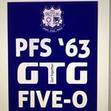Farouk Gulsara's Blog, page 96
March 31, 2020
The top, below and the will to fall.
The Platform (El Hoyo, Spanish, 2019)
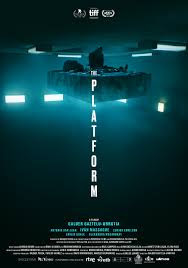 The recent shopping spree shown by the public before an imminent lockdown following the Covid-19 shows how self-centred and selfish our society is. Some people stock up toilet rolls by the trolleys full just because they do not have to worry whether there is money left to be used for other things. The last thing on their mind is the fear of creating panic buying or that his fellow human will be struggling to get his.
The recent shopping spree shown by the public before an imminent lockdown following the Covid-19 shows how self-centred and selfish our society is. Some people stock up toilet rolls by the trolleys full just because they do not have to worry whether there is money left to be used for other things. The last thing on their mind is the fear of creating panic buying or that his fellow human will be struggling to get his.
Some will blame the individual for such behaviour, whereas others will say that the system created such monsters.
We should be the change that we want, it is easy to say. Unfortunately, we are worried about our survival that we care less for others. Perhaps, we should learn that the joy of being wealthy is not in spending capriciously but using it judiciously.
The change in a broken system does not start from high above but from the people lower down the food chain. The ruling class do not see anything in the structure as it benefits them. Those in the lower rung are too disjointed and entrenched in their miseries that they feel helpless the corrupt. A change within the system needs to be initiated by the middle class to send a message to the ruling class that their system is broken and needed to be amended. This is a revolution. For this, there are people on the top, in the bottom and people who would fall for their cause in their course of action.
This Spanish film tells us about the monster that capitalism, which exploits our primal desires, has created. Symbolically, it shows a vertical prison where food is transported via a platform from level 0 all the way down to level 333 (as we later discover. 2 persons per floor would make it 666 occupants. 666, being the devil's reference, show the demonic nature of Man to survive.).
The problem is the people on the top floors gorge on the offering, leaving crumbs or nothing for the rest below. Sometimes, they had to resort to cannibalism. Every month, their levels are changed at random. The upper occupants of the jail feel it is their time to indulge as they may not be so lucky the following month.
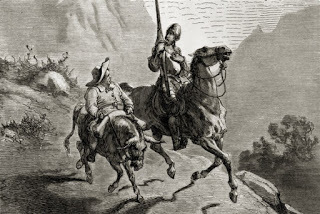 Don Quixote and his sidekick Sancho Panza
Don Quixote and his sidekick Sancho Panza
- symbols for politics, beliefs and identity.
(Much like Adishankara who travelled to the four
corners of the Indian subcontinent to unite the nation)The whole set-up stinks to high heavens, but no one is willing to take the lead to change or want to improve themselves. At the end of the day, someone had to take the fall to send a signal to the top by influencing the occupants of the bottom.
Just like how Don Quixote who travelled around the Spanish countryside to write an account and to unite the people, here the protagonist goes through all the levels to send a message of change. His philosophies of life are heard loud and clear in this show. Maybe, there is a hint that religion that could be an unnecessary diversion. Somewhere in the dialogue, one justifies cannibalism for survival by quoting a phrase often linked to Christianity - whoever eats the flesh and drinks the blood will live for eternity. It may be a suggestion that religion only relieves with short-term problems, not in our long-term living situations. That needs a change of mindset, excellent leadership from the middle strata of society, one who is knowledgable (one who reads) and a revolution of thoughts.
A thought-provoking one but not for the faint-hearted.

This work is licensed under a Creative Commons Attribution 4.0 International License.
http://asok22.wix.com/real-lesson
http://.facebook.com/farouk.gulsara
www.riflerangeboy.com
This work is licensed under a Creative Commons Attribution 4.0 International License.

 The recent shopping spree shown by the public before an imminent lockdown following the Covid-19 shows how self-centred and selfish our society is. Some people stock up toilet rolls by the trolleys full just because they do not have to worry whether there is money left to be used for other things. The last thing on their mind is the fear of creating panic buying or that his fellow human will be struggling to get his.
The recent shopping spree shown by the public before an imminent lockdown following the Covid-19 shows how self-centred and selfish our society is. Some people stock up toilet rolls by the trolleys full just because they do not have to worry whether there is money left to be used for other things. The last thing on their mind is the fear of creating panic buying or that his fellow human will be struggling to get his. Some will blame the individual for such behaviour, whereas others will say that the system created such monsters.
We should be the change that we want, it is easy to say. Unfortunately, we are worried about our survival that we care less for others. Perhaps, we should learn that the joy of being wealthy is not in spending capriciously but using it judiciously.
The change in a broken system does not start from high above but from the people lower down the food chain. The ruling class do not see anything in the structure as it benefits them. Those in the lower rung are too disjointed and entrenched in their miseries that they feel helpless the corrupt. A change within the system needs to be initiated by the middle class to send a message to the ruling class that their system is broken and needed to be amended. This is a revolution. For this, there are people on the top, in the bottom and people who would fall for their cause in their course of action.
This Spanish film tells us about the monster that capitalism, which exploits our primal desires, has created. Symbolically, it shows a vertical prison where food is transported via a platform from level 0 all the way down to level 333 (as we later discover. 2 persons per floor would make it 666 occupants. 666, being the devil's reference, show the demonic nature of Man to survive.).
The problem is the people on the top floors gorge on the offering, leaving crumbs or nothing for the rest below. Sometimes, they had to resort to cannibalism. Every month, their levels are changed at random. The upper occupants of the jail feel it is their time to indulge as they may not be so lucky the following month.
 Don Quixote and his sidekick Sancho Panza
Don Quixote and his sidekick Sancho Panza- symbols for politics, beliefs and identity.
(Much like Adishankara who travelled to the four
corners of the Indian subcontinent to unite the nation)The whole set-up stinks to high heavens, but no one is willing to take the lead to change or want to improve themselves. At the end of the day, someone had to take the fall to send a signal to the top by influencing the occupants of the bottom.
Just like how Don Quixote who travelled around the Spanish countryside to write an account and to unite the people, here the protagonist goes through all the levels to send a message of change. His philosophies of life are heard loud and clear in this show. Maybe, there is a hint that religion that could be an unnecessary diversion. Somewhere in the dialogue, one justifies cannibalism for survival by quoting a phrase often linked to Christianity - whoever eats the flesh and drinks the blood will live for eternity. It may be a suggestion that religion only relieves with short-term problems, not in our long-term living situations. That needs a change of mindset, excellent leadership from the middle strata of society, one who is knowledgable (one who reads) and a revolution of thoughts.
A thought-provoking one but not for the faint-hearted.

This work is licensed under a Creative Commons Attribution 4.0 International License.
http://asok22.wix.com/real-lesson
http://.facebook.com/farouk.gulsara
www.riflerangeboy.com
This work is licensed under a Creative Commons Attribution 4.0 International License.

Published on March 31, 2020 00:13
March 29, 2020
Get out of your comfort zone!
Antifragile - Things that gain from disorder
Author - Nassim Nicholas Taleb (2012)
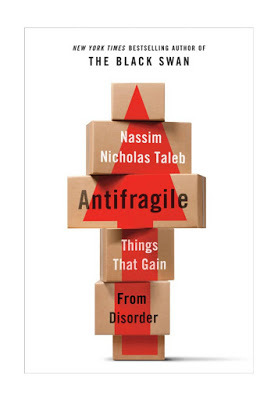 This is a thick book written by a mathematician, a hedge fund manager, a derivatives trader, a businessman and polyglot, Nassim Nicholas Taleb. He reads ten languages.
This is a thick book written by a mathematician, a hedge fund manager, a derivatives trader, a businessman and polyglot, Nassim Nicholas Taleb. He reads ten languages.
People, like things around us, are of three kinds. They are either fragile which crumple or break with pressure, robust which can withstand stresses or the others which actually grow stronger with strains. These are the anti-fragile. The analogy of a fragile situation is like Damocles in the palace of Dionysius standing precariously under the sword held on by a strand of horsehair. A robust person is like the Phoenix who, despite defeats, come from the ashes to fight back. He can fight, but he is as durable as before, not stronger. The perfect example of an anti-fragility is Hydra, the mythical Greek creature who grew two heads every time one of its heads was cut. In other words, it grew with adversity.
The author suggests that Nature, over the years, has a recurring demonstration on antifragility. Whatever does not kill us will make us stronger. Our civilisation turned us into 'fragilitas'. We have been shielded all through our young age, thanks to immunisation, protection from diseases, helicopter parenting by football mums and or education system which paves a smooth path into adulthood.
Take the example, the story of Agrippina, Roman Emperor Nero's scandalous mother. Knowing a bit or two about poisoning, after allegedly killing her husband earlier, she suspected Nero of trying to poison her. To make herself resilient against possible poisoning, she started consuming minute and incremental doses. This is the basis of homoeopathic medicine, administrating highly diluted substances for the body to heal itself. Pharmacologists coined the word 'hormesis' when a small dose of harmful material is actually beneficial for the organism, acting as medicine.
Just like how carrying weights increases the bulk and endurance of our muscles, intermittent stresses encourages post-traumatic growths (as opposed to PTSD). Randomness in life also strengthens people against Black Swan events in politics and economics.
Humans are emotional creatures. When the going is good, we are lulled to believe that everything will be alright forever. Like a turkey, we will be thankful to the farmer for feeding promptly, not knowing that come Thanksgiving it will be culled. What makes the species stronger is not peace but adversity.
Modern society reduces variations. Taleb brings in the example of Procrustes who cuts the legs of his travellers or stretching them to fit them into the beds. Modernity is the Procrustean bed that tailor-makes its occupants.
Our ancestors probably were right with their age-old practices which were handed down to them from people before them. After looking at the ups-and-downs of the environment around us, they must have thought, of our grandmothers' remedies and advice that should logically stand the test of time. And we do not need double-blind controlled studies for everything. Especially when it comes from the pharmaceutical companies or physicians who have vested or economic interests in its outcome and usage.
The book goes on to discuss in length into many subjects related to antifragility, making oneself secure in facing adversities. Procrastination may not be all bad. Many creative thinkings materialised when thoughts were pushed aside, let to simmer in the hidden crypts of the brain. Even Darwin's last book took 38 years to be published. Creative juices sometimes flow after long procrastination. Perhaps, it is not wise to practise this during an emergency situation.
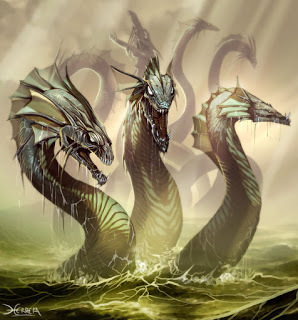 Lernean Hydra
Lernean Hydra
Degrees are not the sure way to solves every of world's problems. Many getting their hands dirty in the field would realise that people who work their way up from scratch are more adapt to handling work-related uncertainties. It is like riding a bicycle. No amount of theoretical knowledge of physics can keep a rider balanced on two wheels. We cannot lecture birds on how to fly.
Sometimes people who are passionate about a subject bring more knowledge to a topic than those who are paid to do it.
On a related note, modernity has made us creatures who have to be fed continuously. Our overindulgence in food has strained our internal systems which had caused many metabolic diseases. To reduce overconsumption, intermittent fasting and food deprivation are suggested ways for our body to economically burn fat efficiently.
Everything is gained from volatility, time is a test of unpredictability and innovations come from uncertainties. Intermittent jolts in life will help us faithful to our intended path in life.
"Perhaps being deprived of poison makes us fragile, and the road to robustification starts with a modicum of harm." – Nassim Nicholas Taleb.

This work is licensed under a Creative Commons Attribution 4.0 International License.
http://asok22.wix.com/real-lesson
http://.facebook.com/farouk.gulsara
www.riflerangeboy.com
This work is licensed under a Creative Commons Attribution 4.0 International License.

 This is a thick book written by a mathematician, a hedge fund manager, a derivatives trader, a businessman and polyglot, Nassim Nicholas Taleb. He reads ten languages.
This is a thick book written by a mathematician, a hedge fund manager, a derivatives trader, a businessman and polyglot, Nassim Nicholas Taleb. He reads ten languages.People, like things around us, are of three kinds. They are either fragile which crumple or break with pressure, robust which can withstand stresses or the others which actually grow stronger with strains. These are the anti-fragile. The analogy of a fragile situation is like Damocles in the palace of Dionysius standing precariously under the sword held on by a strand of horsehair. A robust person is like the Phoenix who, despite defeats, come from the ashes to fight back. He can fight, but he is as durable as before, not stronger. The perfect example of an anti-fragility is Hydra, the mythical Greek creature who grew two heads every time one of its heads was cut. In other words, it grew with adversity.
The author suggests that Nature, over the years, has a recurring demonstration on antifragility. Whatever does not kill us will make us stronger. Our civilisation turned us into 'fragilitas'. We have been shielded all through our young age, thanks to immunisation, protection from diseases, helicopter parenting by football mums and or education system which paves a smooth path into adulthood.
Take the example, the story of Agrippina, Roman Emperor Nero's scandalous mother. Knowing a bit or two about poisoning, after allegedly killing her husband earlier, she suspected Nero of trying to poison her. To make herself resilient against possible poisoning, she started consuming minute and incremental doses. This is the basis of homoeopathic medicine, administrating highly diluted substances for the body to heal itself. Pharmacologists coined the word 'hormesis' when a small dose of harmful material is actually beneficial for the organism, acting as medicine.
Just like how carrying weights increases the bulk and endurance of our muscles, intermittent stresses encourages post-traumatic growths (as opposed to PTSD). Randomness in life also strengthens people against Black Swan events in politics and economics.
Humans are emotional creatures. When the going is good, we are lulled to believe that everything will be alright forever. Like a turkey, we will be thankful to the farmer for feeding promptly, not knowing that come Thanksgiving it will be culled. What makes the species stronger is not peace but adversity.
Modern society reduces variations. Taleb brings in the example of Procrustes who cuts the legs of his travellers or stretching them to fit them into the beds. Modernity is the Procrustean bed that tailor-makes its occupants.
Our ancestors probably were right with their age-old practices which were handed down to them from people before them. After looking at the ups-and-downs of the environment around us, they must have thought, of our grandmothers' remedies and advice that should logically stand the test of time. And we do not need double-blind controlled studies for everything. Especially when it comes from the pharmaceutical companies or physicians who have vested or economic interests in its outcome and usage.
The book goes on to discuss in length into many subjects related to antifragility, making oneself secure in facing adversities. Procrastination may not be all bad. Many creative thinkings materialised when thoughts were pushed aside, let to simmer in the hidden crypts of the brain. Even Darwin's last book took 38 years to be published. Creative juices sometimes flow after long procrastination. Perhaps, it is not wise to practise this during an emergency situation.
 Lernean Hydra
Lernean HydraDegrees are not the sure way to solves every of world's problems. Many getting their hands dirty in the field would realise that people who work their way up from scratch are more adapt to handling work-related uncertainties. It is like riding a bicycle. No amount of theoretical knowledge of physics can keep a rider balanced on two wheels. We cannot lecture birds on how to fly.
Sometimes people who are passionate about a subject bring more knowledge to a topic than those who are paid to do it.
On a related note, modernity has made us creatures who have to be fed continuously. Our overindulgence in food has strained our internal systems which had caused many metabolic diseases. To reduce overconsumption, intermittent fasting and food deprivation are suggested ways for our body to economically burn fat efficiently.
Everything is gained from volatility, time is a test of unpredictability and innovations come from uncertainties. Intermittent jolts in life will help us faithful to our intended path in life.
"Perhaps being deprived of poison makes us fragile, and the road to robustification starts with a modicum of harm." – Nassim Nicholas Taleb.

This work is licensed under a Creative Commons Attribution 4.0 International License.
http://asok22.wix.com/real-lesson
http://.facebook.com/farouk.gulsara
www.riflerangeboy.com
This work is licensed under a Creative Commons Attribution 4.0 International License.

Published on March 29, 2020 09:16
March 27, 2020
We are all that we got!
Ad Astra (To the stars; 2019)
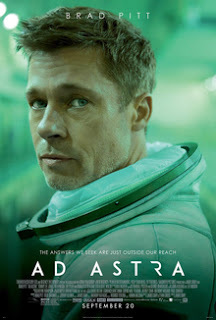
The people around us are the only ones we have got. Nothing more, nothing less. We should forget all our singlemindedness to look out for that special friendship or that unique utopia where we hope to find happiness. There is no one out there looking out for us or anyone calling out for us, dying to make contact. We are all alone perched in this cold place called Universe. Deal with it.
We are stranded on this big (or rather small) blue marble floating in space with no intelligent life forms for light-years away. Rather than building a wall around us, between our family members, between nations and diversions that divide us, we should concentrate on building bridges.
This science-fiction adventure film is supposed to be set in the new future, but my guess is that it is not going to be that close. The movie is set at a time when space tourism is mainstream. Travelling to the Moon is akin to flying on a low-cost flight - passengers pay for their face towels!
Major Roy McBride is an astronaut who lives in a world troubled with frequent power surges. The Space Command (Aeronautical Agency) thinks it is related to an abandoned space mission which is stranded in planet Neptune. The said spacecraft was led by McBride's father. Even though he is hailed as a hero, his whereabouts are unknown. McBride is sent on a secret mission to Neptune to explore the 'empty' capsule. Insider information reveals that McBride Sr may still be alive.
Roy, a loner throughout his life, grew up in the shadows of his father's laurels but without his presence. Perhaps of the longing for father issues and his single-heartedness in excel in space exploration, Roy was never close his now estranged wife.

The journey is a soul searching expedition of sorts for Major Roy McBride, especially now that he is a passenger. He looks at the 'world' around him, the life that he had led and about life generally.
After slashing and mutilating all the resources on Earth, humans had already turned Moon into another touristy spot. With so development and concrete buildings, it just looks like another colony in the Wild West, even complete with moon mobile highway robbers, just like how the trains were robbed during the Californian gold rush era.
In the movie, religiosity seems to have made a comeback. The question of the dead, being stranded in space, being part of the cosmos, like going back to the Maker, if the Maker was indeed out there, is accepted in everyday life.
The answers, as the protagonist soon discovers, are all here on Earth. It lies with us and amongst our loved ones. We are all that we got, for each other.
 This work is licensed under a Creative Commons Attribution 4.0 International License.
This work is licensed under a Creative Commons Attribution 4.0 International License.
http://asok22.wix.com/real-lesson
http://.facebook.com/farouk.gulsara
www.riflerangeboy.com
This work is licensed under a Creative Commons Attribution 4.0 International License.


The people around us are the only ones we have got. Nothing more, nothing less. We should forget all our singlemindedness to look out for that special friendship or that unique utopia where we hope to find happiness. There is no one out there looking out for us or anyone calling out for us, dying to make contact. We are all alone perched in this cold place called Universe. Deal with it.
We are stranded on this big (or rather small) blue marble floating in space with no intelligent life forms for light-years away. Rather than building a wall around us, between our family members, between nations and diversions that divide us, we should concentrate on building bridges.
This science-fiction adventure film is supposed to be set in the new future, but my guess is that it is not going to be that close. The movie is set at a time when space tourism is mainstream. Travelling to the Moon is akin to flying on a low-cost flight - passengers pay for their face towels!
Major Roy McBride is an astronaut who lives in a world troubled with frequent power surges. The Space Command (Aeronautical Agency) thinks it is related to an abandoned space mission which is stranded in planet Neptune. The said spacecraft was led by McBride's father. Even though he is hailed as a hero, his whereabouts are unknown. McBride is sent on a secret mission to Neptune to explore the 'empty' capsule. Insider information reveals that McBride Sr may still be alive.
Roy, a loner throughout his life, grew up in the shadows of his father's laurels but without his presence. Perhaps of the longing for father issues and his single-heartedness in excel in space exploration, Roy was never close his now estranged wife.

The journey is a soul searching expedition of sorts for Major Roy McBride, especially now that he is a passenger. He looks at the 'world' around him, the life that he had led and about life generally.
After slashing and mutilating all the resources on Earth, humans had already turned Moon into another touristy spot. With so development and concrete buildings, it just looks like another colony in the Wild West, even complete with moon mobile highway robbers, just like how the trains were robbed during the Californian gold rush era.
In the movie, religiosity seems to have made a comeback. The question of the dead, being stranded in space, being part of the cosmos, like going back to the Maker, if the Maker was indeed out there, is accepted in everyday life.
The answers, as the protagonist soon discovers, are all here on Earth. It lies with us and amongst our loved ones. We are all that we got, for each other.
 This work is licensed under a Creative Commons Attribution 4.0 International License.
This work is licensed under a Creative Commons Attribution 4.0 International License.
http://asok22.wix.com/real-lesson
http://.facebook.com/farouk.gulsara
www.riflerangeboy.com
This work is licensed under a Creative Commons Attribution 4.0 International License.

Published on March 27, 2020 09:01
March 25, 2020
A peek into the human psyche...
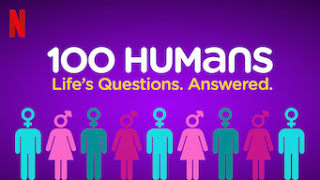 100 humans (Netflix, 2020)
100 humans (Netflix, 2020)
This could be one of the series which one can skim as he undergoes house arrest during these trying times of combating Covid-19. Even though the show brags of trying to answer all of life's questions on humans and their behaviours through its social experiments, it is, by no means, cerebral.
The Guardian labels it as one of the most worthless reality-experiment-pseudoscience show in history. Perhaps, it is a bit unkind to label it such, but some of the experiments that the show do are quite outlandish and their conclusions simplistic.
Some of the life questions that the show asks include 'What makes Us Attractive', 'Best Age to be Alive', 'about the Battle of the Sexes', 'Biasness of Society', 'Happiness', 'Pain versus Pleasure' and 'Distrusting our Senses'.
One of the bizarre assumptions here is that the ability of a male to dance is indicative of attractiveness, hence, potentially fertile. And the fertilising ability is deduced from a seminal analysis. Someone who has the grooves on the dance is supposed to be teeming with swimmers. Of course, one does not develop two left feet once he undergoes a vasectomy. Clinically we know that sperm count is not indicative of virility.
Besides that, there are a few interesting discussions with their guest psychologists and psychiatrists. Do uniforms make a person more desirable? Maybe a person in authority but definitely not in the lower rung of the society. Does a symmetrically balanced facial cut give one a get-out-of-jail-card free? It apparently does. And being comically funny melt hearts?
 The schism between the sexes is discussed. The classic stereotyping of ladies not keeping to time is said to be debunked. The guys are, however, quite economical with their words. The graph of happiness is convexed at either end of one's lifespan. The young look at the life ahead of them of zest while the silver-haired are happy doing what they like at a leisurely pace. The concepts of fluid and crystalline memories are discussed briefly.
The schism between the sexes is discussed. The classic stereotyping of ladies not keeping to time is said to be debunked. The guys are, however, quite economical with their words. The graph of happiness is convexed at either end of one's lifespan. The young look at the life ahead of them of zest while the silver-haired are happy doing what they like at a leisurely pace. The concepts of fluid and crystalline memories are discussed briefly. Whether we like it or not, people are biased. Their opinions of people are made from a composite of the colour of their skin, their previous experiences and prejudices, gender biases and accents. (maybe religion too but it is not discussed here.)
To a certain level, we are all social animals and are prone to conform to society. Herd mentality is prevalent.
Money makes people work harder. However, when it comes to creativity, passion supersedes financial remunerations to create that Van Gogh or Mona Lisa. Music has shown to affect our moods and even increased our boldness to take risks. The idea of a person with a surname that starts in the earlier part of the alphabet list tends to do better in life may not really true.
Overall, when you are quarantined in the house in the company of your loved ones and start questioning the purpose of your existence on Earth, this may be a precursor to the journey of self-discovery.
 This work is licensed under a Creative Commons Attribution 4.0 International License.
This work is licensed under a Creative Commons Attribution 4.0 International License.
http://asok22.wix.com/real-lesson
http://.facebook.com/farouk.gulsara
www.riflerangeboy.com
This work is licensed under a Creative Commons Attribution 4.0 International License.

Published on March 25, 2020 09:01
March 23, 2020
Tabligh Jama'at Movement
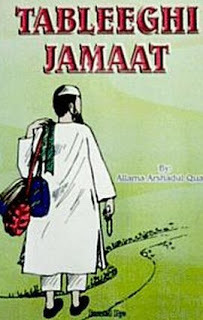 FOR GENERAL INFORMATION
FOR GENERAL INFORMATION
• Farish A. Noor is Associate Professor at the S. Rajaratnam School of International Studies, Nanyang Technological University.
Muslim missionary movement Tablighi Jama'at encourages followers to move out of their comfort zones - literally. It also emphasises social welfare. Appealing to the latter and engaging followers positively will get them to self-regulate their movements, and help to contain the virus pandemic.By now alarm has been raised about the numbers of people who have been infected with the coronavirus after attending a large gathering of the Tablighi Jama'at religious movement at the Sri Petaling mosque complex in Malaysia.The gathering, held on the outskirts of Kuala Lumpur from Feb 27 to March 1, reportedly involved about 16,000 people from several countries who are devotees of the Tablighi Jama'at movement. The Ministry of Health is tracing the contacts of about 90 Singaporeans who attended the gathering after five were diagnosed with Covid-19 as of Sunday.Having gotten themselves infected due to the lack of social distancing, many of the members of this group have returned to their respective countries in the ASEAN region, including Singapore, and there is a worry that the virus may spread even further as a result of such large-scale human movement.
WHAT IS THE TABLIGHI JAMA'AT?The Tablighi Jama'at is a lay missionary pietist movement among Muslims that emerged in India a century ago, and from the outset, it has laid enormous emphasis on the need for individual believers to leave their comfort zones, go out into the world to face challenges and hardship, and to renounce all things worldly and materialistic.For seven years, I conducted fieldwork with the movement, and during this time, I travelled along with members of the Tabligh all over the world, from the United Kingdom, France and Germany to India, Pakistan, Bangladesh and then on to almost every part of South-east Asia.This need to travel - which some of the members described to me as being on a state of permanent pilgrimage - lies at the core of what the Tabligh is as a movement of faith renewal. When the Tabligh was formed in northern India in the early part of the 20th century, it regarded the state of Muslims as abysmal. The founders of the movement argued that the faith of many Muslims had been weakened as a result of their attachment to all things worldly and materialistic, and they believed that one has to renounce attachments to worldly things in order to be truly free to believe sincerely.I have met scores of members from all walks of life who have, upon joining the movement, renounced their worldly attachments and stopped doing things like watching TV, wasting time on social media, or give up smoking or drugs.In many ways the Tabligh was and remains a largely benign movement: It has never sought out confrontation with other faith communities (as it largely confines its activities to another fellow Muslims) and it has never had any political ambitions (for it regards politics as something worldly and therefore a distraction from faith and love for God). Outsiders have sometimes seen them as fatalistic, apolitical and apathetic to the wider needs of society, but the members would argue that one cannot change the world positively unless one has been a better and more faithful individual first.
A MOVEMENT THAT MOVESWhat is special about the Tabligh is that it is a non-centred movement that does not have the rigidity of parties, organisations or corporations. Membership is open to all and on a flexible basis: Some join and follow the Tabligh for a weekend a month, some for weeks or months per year, some for life.One thing that they all do is move, in order to meet other members of the faith community and to weaken their bonds to the material world around them. They do not stay in hotels when they travel (for that would be unseemly and too worldly), but choose to stay in mosques and seminaries that they occupy.It is impossible to exaggerate the extent to which this is a mobile movement. I have interviewed many of their members, all of whom have travelled around the region and beyond, and I have been amazed by the stories they shared with me.Once, in the Indonesian province of West Papua, I met a Tabligh lad who had travelled all the way to Peru - via Jakarta then to Singapore, then to Japan, then to Los Angeles, on to Mexico and finally to Peru and back again. At the large gatherings of the Tabligh I have attended in Pakistan, southern Thailand (at Yala) and Java (at Temboro), I have met thousands of Tablighs from every part of the world.
CAN THE TABLIGH REGULATE ITSELF?Governments the world over are now faced with the difficult task of educating their respective populations and encouraging people to maintain a healthy social distance from one another while avoiding large gatherings. This poses a problem for movements that conduct pilgrimages in groups, and this applies not only to the Tabligh but also Christians who undertake pilgrimages along the pilgrimage trails of Europe, Hindus who visit temples, and Buddhists who make pilgrimages to shrines.So what is the best way forward with groups such as these?First, we should remember that the Tabligh has, in fact, had to self-regulate its activities and movements in the recent past.Two decades ago when Indonesia was in the grip of violent militancy, the Tabligh was infiltrated and used as a vehicle by some radicals who sought to move across Indonesia anonymously. When it was discovered that terrorists had used the movement as a means to get to places like Bali, the Tabligh responded by checking on its members and ensuring that their movement would not become the vector for violence in the country.As the Tabligh is a movement of faith and it cares about the welfare of its members, it should be made clear to them that social responsibility is also an important value in religion. Muslim history has many examples of how Muslim rulers have imposed controls on movement in times of epidemics, and Muslim scholars have always laid great emphasis on the concept of collective social well-being.So rather than scapegoating or victim-blaming the Tablighi movement and its members, a better approach would be to engage them constructively while opening opportunity structures for them to demonstrate social responsibility instead.And what applies to the Tabligh will also apply to all itinerant movements and pilgrimage groups that likewise move from one place to another. By not singling out the Tabligh as a unique problem, we avoid the mistake of adding stigma to the crisis, and by engaging them positively, such movements can actually play an important role in containing this virus pandemic.The underlying message ought to be that social welfare and caring for the greater good of society are also components of faith, and they are not incompatible.
http://asok22.wix.com/real-lesson
http://.facebook.com/farouk.gulsara
www.riflerangeboy.com
This work is licensed under a Creative Commons Attribution 4.0 International License.

Published on March 23, 2020 17:03
March 22, 2020
Carved to perfection?
Under the Knife - A History of Surgery in 28 Remarkable Operations (2018)
Author: Arnold Van De Laar
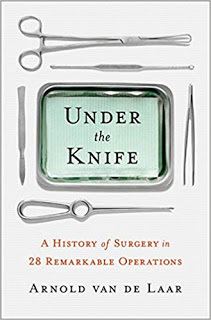 Most nations in the world are forever looking out to keep their brains within their boundaries. Brains, besides economics, are the main ingredients of nation-building. For this, it needs the services of the top five professional vocations - architects, accountants, engineers, maybe lawyers and doctors.
Most nations in the world are forever looking out to keep their brains within their boundaries. Brains, besides economics, are the main ingredients of nation-building. For this, it needs the services of the top five professional vocations - architects, accountants, engineers, maybe lawyers and doctors.
Critical thinking and thinking outside the box are pre-requisites to unshackle the chains of poverty. Ironically, doctors are not expected to be too creative. They are merely expected to conform and follow the precedence as set by their seniors. No patients want to be treated by a 'cowboy'. New ventures can only be under the purview of peers of high standings. Misadventures stemming from unconventional, novel and experimental modalities will implore the wrath of the society, not praises for innovations.
This book is a collection of about 28 kinds of surgeries and a little of history associated with them. It goes as far back as to a time when analgesia was a long shot of brandy or chewing on some roots. And the removal of bladder stones meant cutting through the highly sensitive and vascular perineal region unanaesthetised and the area was to be left unsutured. Sutured had not been invented yet.
Jan De Vaat, a Dutch surgeon, had the dubious honour of operating on his own bladder stone. The lithotomy position, used by most gynaecological patients, got its name from these operations as it was in that position bladder stones were removed (lith - stone, otomy - cut).
It brings to the time when JFK was brought to the casualty unit in a Dallas hospital after being shot. The surgeon on-call had to perform a tracheostomy to create an airway, but the President succumbed to hypoxia due to a torn trachea and massive blood loss. JFK may have been saved if he had an airway secured within the 8-minute critical window. Probably that is why now an ambulance with a medical team accompanies any of the President's entourage to institute immediate treatment. A similar situation befell upon George Washington. He had a nasty throat infection for which an age-old practice of blood-letting was established instead of tracheostomy. He lost 2.5 litres of blood in 16 hours.
The practice of mandatory circumcision probably arose from Abraham's phimosis. The scriptures made mention of Abraham having painful erections; hence coitus was avoided, and Sarah remained childless. He sliced off the tight prepuce with a stone, and he was relieved of his misery. Sarah soon conceived. King Louis XVI probably suffered the same ailment, but he was relieved by ointments.
Many of the medical conditions here are explained in simple terms for the general public to follow the discussions. Empress Sisi of Austria's ability to witness a stab wound on her chest was due to the tamponade by her corset.
Obesity was an issue even during the early years of the Papacy. Of course, Popes were old when they were ordained. Nevertheless, the 5-year survival rate of Popes is 54%. Many died soon after installed. The lingering rumour is the allegation of foul play, but lifestyles diseases and obesity predominate.
Pope Paul John II was not so lucky with bullets. He once was shot in the abdomen and ended up with a temporary colostomy. He ceremoniously visited his assailant in prison.
Hammurabi had laid down a code for practising physicians. The patient cannot be charged if he is not cured of his ailment. The author relates the story of King Darius, who had an ankle fracture. Egyptians used to have great doctors, it seems, and one of their doctors supposedly treated it.
Many of the general surgeons' jobs revolve around the fact that we are biped. Ever since Lucy, our first ancestor, started walking erect, homo sapiens have to deal with varicose veins, inguinal hernia, haemorrhoids, disc prolapse, genital prolapse as well as hip and knee problems. Incidentally, Lucy is named such because of the song that was playing in the background when her fossils were excavated - Lucy in the Sky of Diamond.
Even though most people think Houdini died underwater, drowning after failing to escape from a locked chest, his cause of death is actually perforated appendicitis with peritonitis.
A dentist in Boston is credited with the honour of administering ether anaesthesia for a surgeon to operate a patient with neck tumour. The surgeon, so impressed with the technique, uttered the historical line, "Gentlemen, this is no humbug." Their European cousins, the British, thought otherwise. That was until the grand multiparous Queen Victoria, in 1847, a year later, had chloroform offered to her by John Snow. The follow-up was not all okay. Queen Victoria suffered postnatal depression, of course not related to anaesthesia. Biblical scholarly were quick to condemn the act as going against Nature as the scriptures state that women must endure labour pains.
With the royal seal established in medicine, other branches of medicine soon gain traction. The importance of handwashing, donning of gloves, hygiene and epidemiology were appreciated.
Because of the nature of human activities and the absence of antibiotics, gangrene was a common occurrence those days. The need for amputation was appreciated.
It is often said that one can train a monkey to perform surgeries. Still, the true mark of a surgeon is in his ability to deduce a diagnosis based on the clinical observations and to deal with complications if it should arise. Saying that history has shown that even experienced surgeons are guilty of running into trouble and failing to identify complications. A case in point was when pioneering vascular, Michael DeBakey, was requested to perform a splenectomy on the leukaemia-inflicted deposed Shah of Persia. A subphrenic abscess developed to be thought of a little bit too late even though the telltale signs were evident for all to elucidate. The monarch succumbed to the complications following the repeat surgery.
Even though the need and safety of surgery are established, some patients still refuse surgical procedures on personal grounds. Bob Marley rejected the idea of losing his big toe even though he was diagnosed with malignant melanoma. His religion, Raftarianism, is against losing body parts. He succumbed to metastasis.
Hippocrates had noted that cutting open the abdomen is always fatal, but we have come a long way doing safe laparotomies, laparoscopies and many abdominoplasties. Gynaecologists started the ball rolling with minimally invasive surgery with visualisation of pelvic organs. There is an interesting description of Einstein and his problem with a dissecting aortic aneurysm. Nissen, famous for his fundoplication surgery for acid reflux, wrapped his aneurysm with simple cellophane paper, which was to spur scarring around the vessel.
Castration remains one of the most frequent surgeries performed in the history of mankind. Maybe the word 'rib' in ancient scriptures somehow denotes the part of the penile 'bone'. In other words, a woman is a castrated male - God made Eve from Adam's rib!
This surgical operation is more than just a medical procedure. It has power-play and political implications. In the imperial courts of China, eunuchs play an essential role in handling affairs of the royal household. They were loyal and efficient workers. They were not mere servants but hold a very subtle unseen control of power in the kingdom.
During the barbaric tyranny of fanatic Islamic tribes, castration was mainstream. It remained a sure way to put cessation to the lineage of their non-believing conquests. And their subjects made good slave material to spur the economy. Even in recent times, chemical castration was instituted to homosexuals. Alan Turing was one such victim. Prostatic cancer is probably the only bona fide indication for castration of unaffected testes.
The place of placebo is firmly rooted in the holistic management of an ailing patient. Alan B Shepard, the first American to fly into space failed to partake in Apollo 11 lunar mission because of vestibular dysfunction. A dubious procedure of unproven value was done on him. In 1971, he finally landed on the last lunar landing through Apollo 14.
An interesting coincidence happened when JFK's assassin, Lee Harvey Oswald, was treated by the same surgeon who treated JFK. He succumbed to the single bullet that pierced his abdomen, injuring many vital blood vessels. In his dying moment, the medical team try to whisper to him to spill the beans whether he was indeed the shooter, but he took the secret with him to the grave.
The first medical prosthesis was probably that for a patient with tuberculosis of the shoulder. It was made from hardened paraffin but failed miserably as the bone was still infected with T.B.
From the misadventures of Lenin who suffered from multiple strokes and paralysis, we appreciated the need for smooth laminar flow in the carotids.
Kocher, a doyen in general surgery, was a pioneer in gastric surgery together with Billroth and Halstead. Kocher was the first surgeon to be awarded the Nobel Prize and has many things named after him - instruments, incisions, signs, manoeuvres, points of references and even a crater on the moon. Ironically, he died after thyroid surgery.
What started as an operation on an electric eel in an Amsterdam zoo, electricity finally evolved to be used as a means to coagulate and cut tissues.
The book ends with pop culture references to the job in many famed Hollywood productions. From female surgeon, Dr Helena Russel in Space:1999 to Robot Surgeons in Star Wars, making surgeons superfluous to software (HAL 9000) overriding human commands in Kubrik's 2001:Space Odyssey and doctors reduced to corpuscle size to perform minimally invasive procedures in Fanstatic Voyage, many of the things that were considered to be in the domain of science fiction are now becoming mainstream.
(P.S. Just a tongue-in-the-cheek statement. The book failed to mention the contribution of other nations in the development of surgical skills and techniques. Maybe it is ignorance. The British, with the privilege of eavesdropping and spy watching on their subjects, discovered of an Indian peasant performing rhinoplasty on a British soldier was cut off by Tipu Sultan's Army.
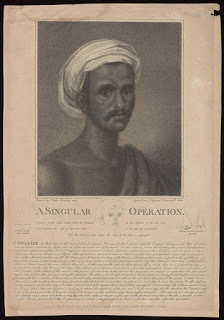 ·
·
On 9 October 1794, an operation to replace the nose, at that point no longer practised in the West, was reported in the Gentleman's Magazine. Cowasjee, a Mahratta, who had served in the British army as a bullock driver was captured by Tipu Sultan and mutilated by having his nose and one of his hands cut off. The nose was replaced from a flap of skin brought down from the forehead to cover the mutilated nose, an operation thought to have beenpractised for centuries in India. This work is licensed under a Creative Commons Attribution 4.0 International License.
This work is licensed under a Creative Commons Attribution 4.0 International License.
http://asok22.wix.com/real-lesson
http://.facebook.com/farouk.gulsara
www.riflerangeboy.com
This work is licensed under a Creative Commons Attribution 4.0 International License.

Author: Arnold Van De Laar
 Most nations in the world are forever looking out to keep their brains within their boundaries. Brains, besides economics, are the main ingredients of nation-building. For this, it needs the services of the top five professional vocations - architects, accountants, engineers, maybe lawyers and doctors.
Most nations in the world are forever looking out to keep their brains within their boundaries. Brains, besides economics, are the main ingredients of nation-building. For this, it needs the services of the top five professional vocations - architects, accountants, engineers, maybe lawyers and doctors. Critical thinking and thinking outside the box are pre-requisites to unshackle the chains of poverty. Ironically, doctors are not expected to be too creative. They are merely expected to conform and follow the precedence as set by their seniors. No patients want to be treated by a 'cowboy'. New ventures can only be under the purview of peers of high standings. Misadventures stemming from unconventional, novel and experimental modalities will implore the wrath of the society, not praises for innovations.
This book is a collection of about 28 kinds of surgeries and a little of history associated with them. It goes as far back as to a time when analgesia was a long shot of brandy or chewing on some roots. And the removal of bladder stones meant cutting through the highly sensitive and vascular perineal region unanaesthetised and the area was to be left unsutured. Sutured had not been invented yet.
Jan De Vaat, a Dutch surgeon, had the dubious honour of operating on his own bladder stone. The lithotomy position, used by most gynaecological patients, got its name from these operations as it was in that position bladder stones were removed (lith - stone, otomy - cut).
It brings to the time when JFK was brought to the casualty unit in a Dallas hospital after being shot. The surgeon on-call had to perform a tracheostomy to create an airway, but the President succumbed to hypoxia due to a torn trachea and massive blood loss. JFK may have been saved if he had an airway secured within the 8-minute critical window. Probably that is why now an ambulance with a medical team accompanies any of the President's entourage to institute immediate treatment. A similar situation befell upon George Washington. He had a nasty throat infection for which an age-old practice of blood-letting was established instead of tracheostomy. He lost 2.5 litres of blood in 16 hours.
The practice of mandatory circumcision probably arose from Abraham's phimosis. The scriptures made mention of Abraham having painful erections; hence coitus was avoided, and Sarah remained childless. He sliced off the tight prepuce with a stone, and he was relieved of his misery. Sarah soon conceived. King Louis XVI probably suffered the same ailment, but he was relieved by ointments.
Many of the medical conditions here are explained in simple terms for the general public to follow the discussions. Empress Sisi of Austria's ability to witness a stab wound on her chest was due to the tamponade by her corset.
Obesity was an issue even during the early years of the Papacy. Of course, Popes were old when they were ordained. Nevertheless, the 5-year survival rate of Popes is 54%. Many died soon after installed. The lingering rumour is the allegation of foul play, but lifestyles diseases and obesity predominate.
Pope Paul John II was not so lucky with bullets. He once was shot in the abdomen and ended up with a temporary colostomy. He ceremoniously visited his assailant in prison.
Hammurabi had laid down a code for practising physicians. The patient cannot be charged if he is not cured of his ailment. The author relates the story of King Darius, who had an ankle fracture. Egyptians used to have great doctors, it seems, and one of their doctors supposedly treated it.
Many of the general surgeons' jobs revolve around the fact that we are biped. Ever since Lucy, our first ancestor, started walking erect, homo sapiens have to deal with varicose veins, inguinal hernia, haemorrhoids, disc prolapse, genital prolapse as well as hip and knee problems. Incidentally, Lucy is named such because of the song that was playing in the background when her fossils were excavated - Lucy in the Sky of Diamond.
Even though most people think Houdini died underwater, drowning after failing to escape from a locked chest, his cause of death is actually perforated appendicitis with peritonitis.
A dentist in Boston is credited with the honour of administering ether anaesthesia for a surgeon to operate a patient with neck tumour. The surgeon, so impressed with the technique, uttered the historical line, "Gentlemen, this is no humbug." Their European cousins, the British, thought otherwise. That was until the grand multiparous Queen Victoria, in 1847, a year later, had chloroform offered to her by John Snow. The follow-up was not all okay. Queen Victoria suffered postnatal depression, of course not related to anaesthesia. Biblical scholarly were quick to condemn the act as going against Nature as the scriptures state that women must endure labour pains.
With the royal seal established in medicine, other branches of medicine soon gain traction. The importance of handwashing, donning of gloves, hygiene and epidemiology were appreciated.
Because of the nature of human activities and the absence of antibiotics, gangrene was a common occurrence those days. The need for amputation was appreciated.
It is often said that one can train a monkey to perform surgeries. Still, the true mark of a surgeon is in his ability to deduce a diagnosis based on the clinical observations and to deal with complications if it should arise. Saying that history has shown that even experienced surgeons are guilty of running into trouble and failing to identify complications. A case in point was when pioneering vascular, Michael DeBakey, was requested to perform a splenectomy on the leukaemia-inflicted deposed Shah of Persia. A subphrenic abscess developed to be thought of a little bit too late even though the telltale signs were evident for all to elucidate. The monarch succumbed to the complications following the repeat surgery.
Even though the need and safety of surgery are established, some patients still refuse surgical procedures on personal grounds. Bob Marley rejected the idea of losing his big toe even though he was diagnosed with malignant melanoma. His religion, Raftarianism, is against losing body parts. He succumbed to metastasis.
Hippocrates had noted that cutting open the abdomen is always fatal, but we have come a long way doing safe laparotomies, laparoscopies and many abdominoplasties. Gynaecologists started the ball rolling with minimally invasive surgery with visualisation of pelvic organs. There is an interesting description of Einstein and his problem with a dissecting aortic aneurysm. Nissen, famous for his fundoplication surgery for acid reflux, wrapped his aneurysm with simple cellophane paper, which was to spur scarring around the vessel.
Castration remains one of the most frequent surgeries performed in the history of mankind. Maybe the word 'rib' in ancient scriptures somehow denotes the part of the penile 'bone'. In other words, a woman is a castrated male - God made Eve from Adam's rib!
This surgical operation is more than just a medical procedure. It has power-play and political implications. In the imperial courts of China, eunuchs play an essential role in handling affairs of the royal household. They were loyal and efficient workers. They were not mere servants but hold a very subtle unseen control of power in the kingdom.
During the barbaric tyranny of fanatic Islamic tribes, castration was mainstream. It remained a sure way to put cessation to the lineage of their non-believing conquests. And their subjects made good slave material to spur the economy. Even in recent times, chemical castration was instituted to homosexuals. Alan Turing was one such victim. Prostatic cancer is probably the only bona fide indication for castration of unaffected testes.
The place of placebo is firmly rooted in the holistic management of an ailing patient. Alan B Shepard, the first American to fly into space failed to partake in Apollo 11 lunar mission because of vestibular dysfunction. A dubious procedure of unproven value was done on him. In 1971, he finally landed on the last lunar landing through Apollo 14.
An interesting coincidence happened when JFK's assassin, Lee Harvey Oswald, was treated by the same surgeon who treated JFK. He succumbed to the single bullet that pierced his abdomen, injuring many vital blood vessels. In his dying moment, the medical team try to whisper to him to spill the beans whether he was indeed the shooter, but he took the secret with him to the grave.
The first medical prosthesis was probably that for a patient with tuberculosis of the shoulder. It was made from hardened paraffin but failed miserably as the bone was still infected with T.B.
From the misadventures of Lenin who suffered from multiple strokes and paralysis, we appreciated the need for smooth laminar flow in the carotids.
Kocher, a doyen in general surgery, was a pioneer in gastric surgery together with Billroth and Halstead. Kocher was the first surgeon to be awarded the Nobel Prize and has many things named after him - instruments, incisions, signs, manoeuvres, points of references and even a crater on the moon. Ironically, he died after thyroid surgery.
What started as an operation on an electric eel in an Amsterdam zoo, electricity finally evolved to be used as a means to coagulate and cut tissues.
The book ends with pop culture references to the job in many famed Hollywood productions. From female surgeon, Dr Helena Russel in Space:1999 to Robot Surgeons in Star Wars, making surgeons superfluous to software (HAL 9000) overriding human commands in Kubrik's 2001:Space Odyssey and doctors reduced to corpuscle size to perform minimally invasive procedures in Fanstatic Voyage, many of the things that were considered to be in the domain of science fiction are now becoming mainstream.
(P.S. Just a tongue-in-the-cheek statement. The book failed to mention the contribution of other nations in the development of surgical skills and techniques. Maybe it is ignorance. The British, with the privilege of eavesdropping and spy watching on their subjects, discovered of an Indian peasant performing rhinoplasty on a British soldier was cut off by Tipu Sultan's Army.
 ·
· On 9 October 1794, an operation to replace the nose, at that point no longer practised in the West, was reported in the Gentleman's Magazine. Cowasjee, a Mahratta, who had served in the British army as a bullock driver was captured by Tipu Sultan and mutilated by having his nose and one of his hands cut off. The nose was replaced from a flap of skin brought down from the forehead to cover the mutilated nose, an operation thought to have beenpractised for centuries in India.
 This work is licensed under a Creative Commons Attribution 4.0 International License.
This work is licensed under a Creative Commons Attribution 4.0 International License.
http://asok22.wix.com/real-lesson
http://.facebook.com/farouk.gulsara
www.riflerangeboy.com
This work is licensed under a Creative Commons Attribution 4.0 International License.

Published on March 22, 2020 09:01
March 20, 2020
Corona the vaccine, we the virus.
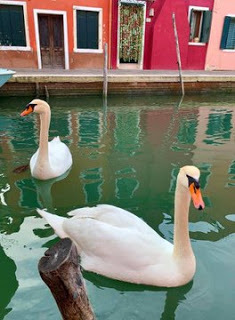 Swans in Venetian Canal
Swans in Venetian CanalCredit @filterjmProbably for the first time since Man started giving salutations to the feared forces around him, he has been asked to stop all kinds of religious congregations in big groups. For aeons, Man believed that maladies take place because the Divine forces have been angered. In their simple understanding, the only avenue left for them to correct the tragedy is to appease the Divinity by glorifying it to high heavens; hoping that He would throw us His Grace.
Hence, despite appeals by the authorities, practitioners of various faiths continue to put their trusts in the forces above, not in rational thinking and the sciences. They feel that people have been misled for far too long. The way the human race appears to be heading does not assure them of a happy ending. Too many have placed self-interest above salvation to expect altruism to prevail.
There are groups of people who are hellbent in finding scapegoats. In their minds, many if not most germs came from the East. In recent memory, we have heard of SARS, H1N1 and Nipah Virus and their fixation with exotic animals like civet cats and bats. In the 14th century, Bubonic Plague and Black Death arose from the Far East via the Silk Road.
Scrolling through the annals of history, one discovers that pretty much every human pathogen originated from our exploitation of animals. Humanity's dominion over animals has unleashed a veritable Pandora's ark of infectious diseases. Most modern human infectious diseases were unknown before domestication led to a mass spillover of animal disease into human populations. For example, tuberculosis appears to have been acquired initially through the domestications of goats but now infects one-third of humanity. Meanwhile, measles and smallpox may have arisen from mutant cattle viruses. We domesticated pigs and got whooping cough, chickens and typhoid fever, ducks and influenza, water buffalos and leprosy as well as horses and cold virus (Michael Greger, How Not to Die).
Or is our decision to self-isolate against each other is Nature's conniving power play to avenge decades of rape of its sovereignty? Look at the countries which were teeming with excessive human activities and see what lockdown has achieved? China's citizens can finally get fresh air and see the blue sky without being enveloped with smog. One week of an absence of gondolas and visitors, dolphins and swans come out to play. It looks like Corona is the vaccine, and we are the virus of Nature.
Since prayers in large enough groups will not see any daylight in the near future, cries for help from the divine forces cannot happen. I guess we have to depend on our God-given intellects to save us from extinction.
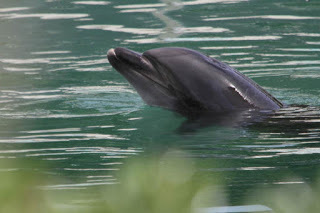 Dolphins have appeared at the Italian coastline after the
Dolphins have appeared at the Italian coastline after theshipping lines were locked down due to coronavirus (REUTERS)
 This work is licensed under a Creative Commons Attribution 4.0 International License.
This work is licensed under a Creative Commons Attribution 4.0 International License.http://asok22.wix.com/real-lesson
http://.facebook.com/farouk.gulsara
www.riflerangeboy.com
This work is licensed under a Creative Commons Attribution 4.0 International License.

Published on March 20, 2020 09:04
March 18, 2020
Dracula in the 21st century!
Dracula (2020)
Miniseries (Season1, Ep 1-3)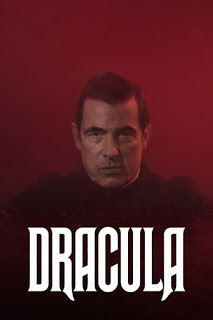
Bram Stoker was a business manager at Lyceum Theatre where he used to write short stories to supplement his income. The book 'Dracula' (Son of a Dragon) is by no means a pioneer work. Stories of that genre had been around since the 1880s. His book came out in 1897, but it was not a bestseller. In fact, in the last years of his life, Bram was so immersed in poverty that he had to live on charity. For sustenance, his widow had to auction off his notes of the novel for a little over £2. Then came an authorised silent German movie 'Nosferatu' based on the story. Stoker's widow sued the film company, after which this book gained popularity.
'The year without a summer', 1816, is often attributed to the genesis of the science fiction genre and Mary Shelley for writing "Frankenstein' when Lake Geneva froze over in summer, one of the party in Shelley's group, John Polidori, started writing a short story named 'Vampyres'.
My lecturers told me that Count Dracula's condition could be a dramatised narration of a sufferer of a real medical condition - acute intermittent porphyria. In a variant of this disease, the inflicted person, through genetic means, suffers from photosensitivity and chronic anaemia from rupturing of blood cell walls. Hence, Dracula has an eversion to sunlight and has suck on his victim's blood to stay alive. Garlic could be an agent that could trigger hemolysis.
Others propose that Dracula could have been inflicted with rabies or pellagra (Niacin, B3 deficiency). Folklore or medical condition, words get altered as it goes from ear to ear, and it gets magnified or exaggerated.
The legend of Dracula and vampires have been told and retold many times over. Naturally, to capture the fancy of the viewers (or readers), it has been altered and spiced up. In this particular offering, the name of the characters are mostly maintained, and the basic plot is kept, the storytellers had decided to bring the Count to the present-day when Demetre (his ship that was travelling to England burned down. Dracula was preserved in his Transylvania soil infused coffin on the ocean floor, only to be 'brought to life' by scientists 123 years later.
Professor Abraham Von Helsing, the nemesis of Dracula in the original story is now a Catholic Nun, Agatha Von Helsing, and in spirit as her granddaughter, a scientist.
An interesting offering. It is exciting to see how the story is twisted around to give it the compelling feel, yet centred around the same theme and infusing present-day environment to it.
(P.S. Dracula's fear of the Cross has nothing to do with the divine qualities of the Cross. It is the strong reflection of light upon it and the constant hint of death to the Count. The crucifixion is a symbol of the sacrifice of Jesus to mankind, continually reminding him of his failure to be in the frontline of the battlefield as it was in his family tradition.)
 This work is licensed under a Creative Commons Attribution 4.0 International License.
This work is licensed under a Creative Commons Attribution 4.0 International License.
http://asok22.wix.com/real-lesson
http://.facebook.com/farouk.gulsara
www.riflerangeboy.com
This work is licensed under a Creative Commons Attribution 4.0 International License.

Miniseries (Season1, Ep 1-3)

Bram Stoker was a business manager at Lyceum Theatre where he used to write short stories to supplement his income. The book 'Dracula' (Son of a Dragon) is by no means a pioneer work. Stories of that genre had been around since the 1880s. His book came out in 1897, but it was not a bestseller. In fact, in the last years of his life, Bram was so immersed in poverty that he had to live on charity. For sustenance, his widow had to auction off his notes of the novel for a little over £2. Then came an authorised silent German movie 'Nosferatu' based on the story. Stoker's widow sued the film company, after which this book gained popularity.
'The year without a summer', 1816, is often attributed to the genesis of the science fiction genre and Mary Shelley for writing "Frankenstein' when Lake Geneva froze over in summer, one of the party in Shelley's group, John Polidori, started writing a short story named 'Vampyres'.
My lecturers told me that Count Dracula's condition could be a dramatised narration of a sufferer of a real medical condition - acute intermittent porphyria. In a variant of this disease, the inflicted person, through genetic means, suffers from photosensitivity and chronic anaemia from rupturing of blood cell walls. Hence, Dracula has an eversion to sunlight and has suck on his victim's blood to stay alive. Garlic could be an agent that could trigger hemolysis.
Others propose that Dracula could have been inflicted with rabies or pellagra (Niacin, B3 deficiency). Folklore or medical condition, words get altered as it goes from ear to ear, and it gets magnified or exaggerated.
The legend of Dracula and vampires have been told and retold many times over. Naturally, to capture the fancy of the viewers (or readers), it has been altered and spiced up. In this particular offering, the name of the characters are mostly maintained, and the basic plot is kept, the storytellers had decided to bring the Count to the present-day when Demetre (his ship that was travelling to England burned down. Dracula was preserved in his Transylvania soil infused coffin on the ocean floor, only to be 'brought to life' by scientists 123 years later.
Professor Abraham Von Helsing, the nemesis of Dracula in the original story is now a Catholic Nun, Agatha Von Helsing, and in spirit as her granddaughter, a scientist.
An interesting offering. It is exciting to see how the story is twisted around to give it the compelling feel, yet centred around the same theme and infusing present-day environment to it.
(P.S. Dracula's fear of the Cross has nothing to do with the divine qualities of the Cross. It is the strong reflection of light upon it and the constant hint of death to the Count. The crucifixion is a symbol of the sacrifice of Jesus to mankind, continually reminding him of his failure to be in the frontline of the battlefield as it was in his family tradition.)
 This work is licensed under a Creative Commons Attribution 4.0 International License.
This work is licensed under a Creative Commons Attribution 4.0 International License.
http://asok22.wix.com/real-lesson
http://.facebook.com/farouk.gulsara
www.riflerangeboy.com
This work is licensed under a Creative Commons Attribution 4.0 International License.

Published on March 18, 2020 09:09
March 15, 2020
Not our crowning glory
 COVID-19?
COVID-19?jumping species or wannabe predator??Is it funny that every time Man thinks that he has it all figured out, Nature (or fate if you like to call it) just jolts him back to reality? Like Will E Coyote and his spanking new latest invention from ACME Corporation, it just falls flat and blows right on his face again and again, and Roadrunner always goes scot-free, scooting off yet again, screeching "beep..beeep!"
The latest viral scare of COVID-19 (Coronavirus Disease 2019) just opens up our vulnerability. All the so-called foolproof systems that we had installed are just scribblings on the sand - they cannot withstand the test of time. And they are so porous. We thought we had all the arsenal that could not only not annihilate our enemies but ourselves in the process too. All these are useless in combating our electron-microscopic size enemy. We are literally crippled by an unseen offending foe. All the King's horses and the King's men cannot put our peace of mind together at least for now.
In the 1990s, our leaders were hellbent on embracing globalisation. They argued that we were heading to a borderless world where physical borders were an illusion. Commerce transcended boundaries, and we should welcome it with open arms. No one could live in isolation. Now, see what is happening. Countries are scurrying to close the borders as not only diseases spread like wildfire, refugees who bungled up their own nation are clawing through the immigration gates displaying their victim card. Many have opted for self-isolation to keep their people safe.
Over-dependence on particular countries for supplies and over-concentration of the supply chain from a specific region has not been a smart move after all. It looks like when China sneezes, the whole world may get pneumonia.
The democratisation of flying made travelling no more an activity of the bourgeois. Now, everyone could fly. With it came secondary industries and opening of new regions and tourists attractions. Unfortunately, the concept of open skies also opened the Pandora box of international subversive activities and seamless flow of problems. At the time of writing the tagline of one of the most popular low-cost airlines has changed from 'Everyone can Fly' to 'No one wants to Fly' or 'Nowhere to Fly'.
We thought the world wide web of interconnectivity was going to transform the world into a utopia of a knowledge-based society, well-informed consumers and broad-thinking creative communities. How naive we were. What we have are fake news of questionable authenticity and a band of fist thumping keyboard warriors who type away their hate speeches under the cloak of anonymity without a thought of the effects of their actions.
Generations before us grew up without any exchange of physical touch or public display of affection. In some societies, physical touch between unmarriageable kins was frowned upon. With open-mindedness, bodily contacts by handshakes, hugging and pecking became the norm. Come SARS, MERS-CoV and now COVID-19, and we are back to our traditional ways of salutations - bowing and placing of own palms together; fear of transmission of pathogens.
Just a thought...
The mighty Chinese armada used to travel to the four corners of the globe. They are said to have 'discovered' the Americas even before Columbus' alternate route to India. But then everything stopped. The Ming Dynasty decided to opt for a closed-door policy of the world. Even the Japanese kingdoms underwent a similar transformation. Was the spread of disease the reason for this move?
(Nerd Alert: Corona is Latin for Crown. Corona also refers to the gaseous accumulation around the Sun (which looks like a crown enveloping the Sun), mainly around its equator. Did you know that there is a field of study dedicated to studying the Sun called Solar Science (Helioseismology)? The suffix 'seismology' is used here because Solar Scientists principally study it via the oscillations of sound waves (?Om - ௐ, ॐ etc.) that are continuously driven and damped by convection near the Sun's surface. One of the puzzling thing about the Sun is that the Corona is hotter than the Sun surface by a factor of 150 to 400. The Corona can reach temperatures of 1 to 3 million Kelvin.)
http://asok22.wix.com/real-lesson
http://.facebook.com/farouk.gulsara
www.riflerangeboy.com
This work is licensed under a Creative Commons Attribution 4.0 International License.

Published on March 15, 2020 09:30
March 13, 2020
The invention that saved a million ships
The Lighthouse (2019)
 When we were young, we were fascinated with the lighthouse. Any sketch of nature would include seas, boats, seagulls, clouds and flashing beacons. As Penang, our hometown is a port city, we had the pleasure of seeing many in our lifetimes.
When we were young, we were fascinated with the lighthouse. Any sketch of nature would include seas, boats, seagulls, clouds and flashing beacons. As Penang, our hometown is a port city, we had the pleasure of seeing many in our lifetimes.
Many stories have been written on the heroic deeds of many a keeper or 'wickies' as they were referred to put their lives at stake to provide a continuous beacon of light to the safety of travelling vessels. The job is an unrewarding one with boredom being the most significant and dangerous occupational hazard to beat. Being located far from civilisation and at precarious locations, access to these places may be easily compromised by inclement weather. Hence, the keepers may sometimes be stranded for months altogether. Solitude was thought to be the single most typical reason for the prevalence of madness in the profession. Another possible aetiology of insanity could be mercury poisoning. In the older models of Fresnel Lens that were used in lighthouses, the lens and light were floated on mercury. The job of regularly cleaning the mercury of impurities exposed the 'wickies' to mercury poisoning. One of the symptoms of mercury poisoning can be the onset of mental derangement.
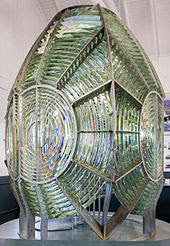 Fresnel Lens - the invention
Fresnel Lens - the invention
that saved a million ships.Neurological symptoms used to be seen in hat makers. The felt used in their work contained mercury. Thus, came the saying, 'mad as a hatter'.
In this day and age, with the advancements in GPS and navigational technologies, are lighthouses still relevant? These days, they are automated and are there just as a backup just in case all the modern tools crash, fail or run out of power supply.
Edgar Allan Poe's last book that he had hardly started before his death in 1849 was unofficially named 'The Light House'. It was a collection of log entries of a newly appointed lighthouse keeper, and the theme was loneliness.
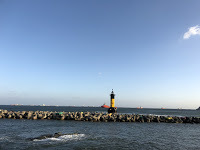 ©FG
©FG
Busan, South Korea.This 2019 film was written with that idea in mind. A rookie is employed to be in a lighthouse under the supervision of a grumpy elderly keeper. The dynamics of their relationship, their unrelenting efforts to keep the beacon of light alive while maintaining their sanity in that cold, damp and hostile environment forms the basis of this psychological drama. Like 1963 'Birds', viewers will never look at a seagull in the same way again. Those scary birds can peck your eyeballs out!
 This work is licensed under a Creative Commons Attribution 4.0 International License.
This work is licensed under a Creative Commons Attribution 4.0 International License.
http://asok22.wix.com/real-lesson
http://.facebook.com/farouk.gulsara
www.riflerangeboy.com
This work is licensed under a Creative Commons Attribution 4.0 International License.

 When we were young, we were fascinated with the lighthouse. Any sketch of nature would include seas, boats, seagulls, clouds and flashing beacons. As Penang, our hometown is a port city, we had the pleasure of seeing many in our lifetimes.
When we were young, we were fascinated with the lighthouse. Any sketch of nature would include seas, boats, seagulls, clouds and flashing beacons. As Penang, our hometown is a port city, we had the pleasure of seeing many in our lifetimes. Many stories have been written on the heroic deeds of many a keeper or 'wickies' as they were referred to put their lives at stake to provide a continuous beacon of light to the safety of travelling vessels. The job is an unrewarding one with boredom being the most significant and dangerous occupational hazard to beat. Being located far from civilisation and at precarious locations, access to these places may be easily compromised by inclement weather. Hence, the keepers may sometimes be stranded for months altogether. Solitude was thought to be the single most typical reason for the prevalence of madness in the profession. Another possible aetiology of insanity could be mercury poisoning. In the older models of Fresnel Lens that were used in lighthouses, the lens and light were floated on mercury. The job of regularly cleaning the mercury of impurities exposed the 'wickies' to mercury poisoning. One of the symptoms of mercury poisoning can be the onset of mental derangement.
 Fresnel Lens - the invention
Fresnel Lens - the inventionthat saved a million ships.Neurological symptoms used to be seen in hat makers. The felt used in their work contained mercury. Thus, came the saying, 'mad as a hatter'.
In this day and age, with the advancements in GPS and navigational technologies, are lighthouses still relevant? These days, they are automated and are there just as a backup just in case all the modern tools crash, fail or run out of power supply.
Edgar Allan Poe's last book that he had hardly started before his death in 1849 was unofficially named 'The Light House'. It was a collection of log entries of a newly appointed lighthouse keeper, and the theme was loneliness.
 ©FG
©FGBusan, South Korea.This 2019 film was written with that idea in mind. A rookie is employed to be in a lighthouse under the supervision of a grumpy elderly keeper. The dynamics of their relationship, their unrelenting efforts to keep the beacon of light alive while maintaining their sanity in that cold, damp and hostile environment forms the basis of this psychological drama. Like 1963 'Birds', viewers will never look at a seagull in the same way again. Those scary birds can peck your eyeballs out!
 This work is licensed under a Creative Commons Attribution 4.0 International License.
This work is licensed under a Creative Commons Attribution 4.0 International License.
http://asok22.wix.com/real-lesson
http://.facebook.com/farouk.gulsara
www.riflerangeboy.com
This work is licensed under a Creative Commons Attribution 4.0 International License.

Published on March 13, 2020 09:01

